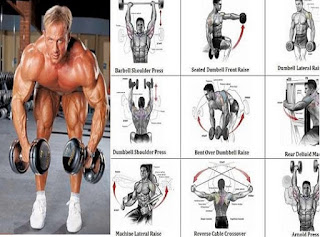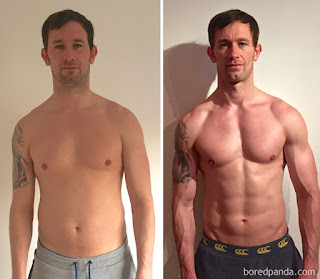What is the Importance of Exercise? /bodybuilding110
We all know that exercise is important in our daily lives, but we may not know why or what exercise can do for us.
It’s important to remember that we have evolved from nomadic ancestors who spent all their time moving around in search of food and shelter, travelling large distances on a daily basis. Our bodies are designed and have evolved to be regularly active.
In the same way that a sports car is designed to go fast, we are designed to move. If the sports car is taken out once a week for a 3 mile round trip through a town centre then it would probably develop engine problems fairly quickly.
Over time people too develop problems if they sit down all day at a desk or in front of the TV and minimise the amount of exercise they do.
One of the main reasons that people opt to do a form of exercise is in order to lose weight and exercise is one of the most effective ways to do this. If you’re BMI (Body Mass Index) is between 25 and 29 you are classed as overweight. If your BMI is above 30 then you are clinically classed as being obese. Your BMI calculates whether you are a healthy weight for your height. Ideally your BMI should be between 18.5 and 24.9. By taking regular exercise you will be able to maintain your BMI, keeping it at an ideal figure.
There are of course many other reasons and many other benefits that make people exercise. Regular exercise helps to maintain your overall fitness and it can lower the risk of many life threatening conditions. People who undertake regular exercise are much more likely to live longer and enjoy a better quality of life. This is backed up by the recent studies that have been conducted which show that being physically unfit is just as dangerous as smoking when it comes to lowering life expectancy.
There are generally three different stages of exercise that people perform, which one you do depends on your overall fitness. These three forms are light, moderate and vigorous exercise. Some examples of light exercise include going for a walk or even doing housework. Moderate exercise however will leave you slightly more out of breath; it may involve going for a brisk walk or walking up a hill. With moderate exercise you should feel slightly worn out, unlike vigorous exercise, which will leave you feeling like you are pushing your body to its limit but in a way that causes you no harm. Some example of vigorous exercise includes jogging, cycling and weight training.
It is important to remember that when exercising your body has to adapt gradually; this is particularly true when it comes to your muscles and joints. Due to this you should always start slowly and build the intensity of your exercise sessions up.
When exercising you should ensure that you do it at your own pace and that you choose something that you enjoy as you are much more likely to stick at your exercise programme if it is something that you like. You should also avoid excessive exercise as exercising all day, everyday is likely to do you more harm than good; you need to give your body time to recover in between exercising.
It’s important to remember that we have evolved from nomadic ancestors who spent all their time moving around in search of food and shelter, travelling large distances on a daily basis. Our bodies are designed and have evolved to be regularly active.
In the same way that a sports car is designed to go fast, we are designed to move. If the sports car is taken out once a week for a 3 mile round trip through a town centre then it would probably develop engine problems fairly quickly.
Over time people too develop problems if they sit down all day at a desk or in front of the TV and minimise the amount of exercise they do.
One of the main reasons that people opt to do a form of exercise is in order to lose weight and exercise is one of the most effective ways to do this. If you’re BMI (Body Mass Index) is between 25 and 29 you are classed as overweight. If your BMI is above 30 then you are clinically classed as being obese. Your BMI calculates whether you are a healthy weight for your height. Ideally your BMI should be between 18.5 and 24.9. By taking regular exercise you will be able to maintain your BMI, keeping it at an ideal figure.
There are of course many other reasons and many other benefits that make people exercise. Regular exercise helps to maintain your overall fitness and it can lower the risk of many life threatening conditions. People who undertake regular exercise are much more likely to live longer and enjoy a better quality of life. This is backed up by the recent studies that have been conducted which show that being physically unfit is just as dangerous as smoking when it comes to lowering life expectancy.
There are generally three different stages of exercise that people perform, which one you do depends on your overall fitness. These three forms are light, moderate and vigorous exercise. Some examples of light exercise include going for a walk or even doing housework. Moderate exercise however will leave you slightly more out of breath; it may involve going for a brisk walk or walking up a hill. With moderate exercise you should feel slightly worn out, unlike vigorous exercise, which will leave you feeling like you are pushing your body to its limit but in a way that causes you no harm. Some example of vigorous exercise includes jogging, cycling and weight training.
It is important to remember that when exercising your body has to adapt gradually; this is particularly true when it comes to your muscles and joints. Due to this you should always start slowly and build the intensity of your exercise sessions up.
When exercising you should ensure that you do it at your own pace and that you choose something that you enjoy as you are much more likely to stick at your exercise programme if it is something that you like. You should also avoid excessive exercise as exercising all day, everyday is likely to do you more harm than good; you need to give your body time to recover in between exercising.




Commentaires
Enregistrer un commentaire